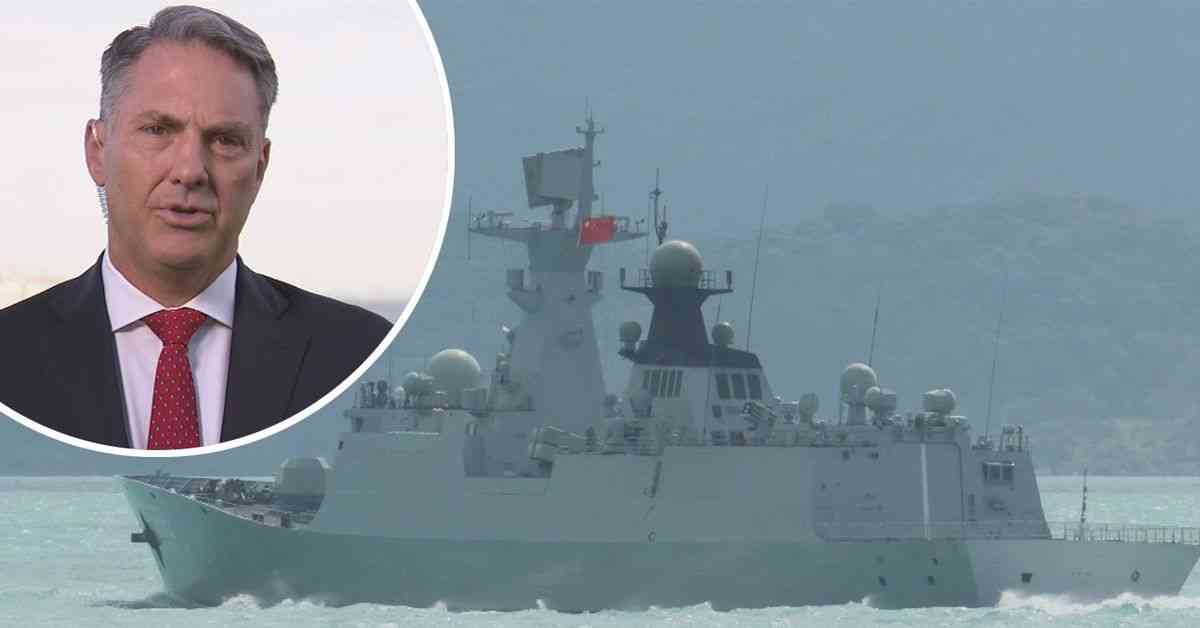Deputy Prime Minister and Defence Minister Richard Marles recently expressed concerns regarding China’s response to reports of warships firing into airspace off the Australian Coast, deeming it “unsatisfactory.” While there has been no confirmation of actual firing, commercial pilots were abruptly notified of a live firing event, leaving many questions unanswered.
Marles, in an interview on Weekend Today, emphasized the significance of the incident, highlighting the lack of adequate notice provided by China. He noted that despite the short timeframe, it was crucial to acknowledge that China had not violated international law. The Deputy Prime Minister pointed out that three Chinese warships positioned just 150 nautical miles off Sydney were under close observation by the Australian Defence Force (ADF).
The notification of the live firing event, according to Marles, created a disruptive situation for airborne vehicles, forcing them to divert around the affected airspace. While the occurrence of the live firing itself remains ambiguous, the Deputy Prime Minister emphasized the importance of addressing the communication breakdown with the Chinese Government. Marles mentioned that efforts had been made to engage with Chinese officials both in Canberra and Beijing, seeking clarification on the lack of prior notice.
In normal circumstances, Marles explained, the Royal Australian Navy would provide a lead time of 12 to 24 hours for live firing exercises in international waters. However, the current situation warranted an exceptional level of surveillance to monitor the activities of the Chinese task group. Marles emphasized the need for increased vigilance to ascertain the intentions of the Chinese ships, reassuring that Australia’s surveillance measures were within the bounds of international law.
Expert Insights on Maritime Security
Maritime security experts have weighed in on the recent events unfolding off the Australian Coast, shedding light on the complexities of naval operations in international waters. Dr. Sarah Johnson, a maritime analyst at a prominent think tank, emphasized the importance of clear communication protocols between naval forces to prevent misunderstandings and potential escalations.
“Instances like these underscore the significance of robust communication channels and adherence to established protocols in maritime encounters. Any discrepancies in notification procedures can lead to heightened tensions and jeopardize regional stability,” Dr. Johnson remarked. She further highlighted the need for transparent dialogue between nations to address concerns and uphold maritime safety standards.
Impact on Regional Relations
The incident involving Chinese warships near the Australian Coast has reverberated across diplomatic circles, raising questions about the broader implications for regional relations. Political analysts suggest that the lack of transparency in military activities could strain bilateral ties between China and Australia, already navigating a complex geopolitical landscape.
Professor David Lee, an expert in international relations, noted the delicate balance of power dynamics in the Asia-Pacific region and the potential ramifications of military posturing. “The recent episode underscores the need for enhanced communication and de-escalation measures to prevent misunderstandings that could spiral into larger conflicts. Both sides must prioritize dialogue and transparency to mitigate tensions and foster mutual trust,” Professor Lee emphasized.
As the situation continues to evolve, stakeholders are closely monitoring developments to gauge the long-term implications of the standoff between China and Australia. The need for open dialogue, adherence to international norms, and proactive engagement remains paramount in ensuring stability and security in the region.
Deputy Prime Minister and Defence Minister Richard Marles has expressed concerns over China’s response to reports of warships firing into airspace off the Australian Coast, emphasizing the need for transparent communication and adherence to maritime protocols. The incident underscores the complexities of naval operations in international waters and the critical importance of fostering dialogue to prevent misunderstandings and maintain regional stability.

















